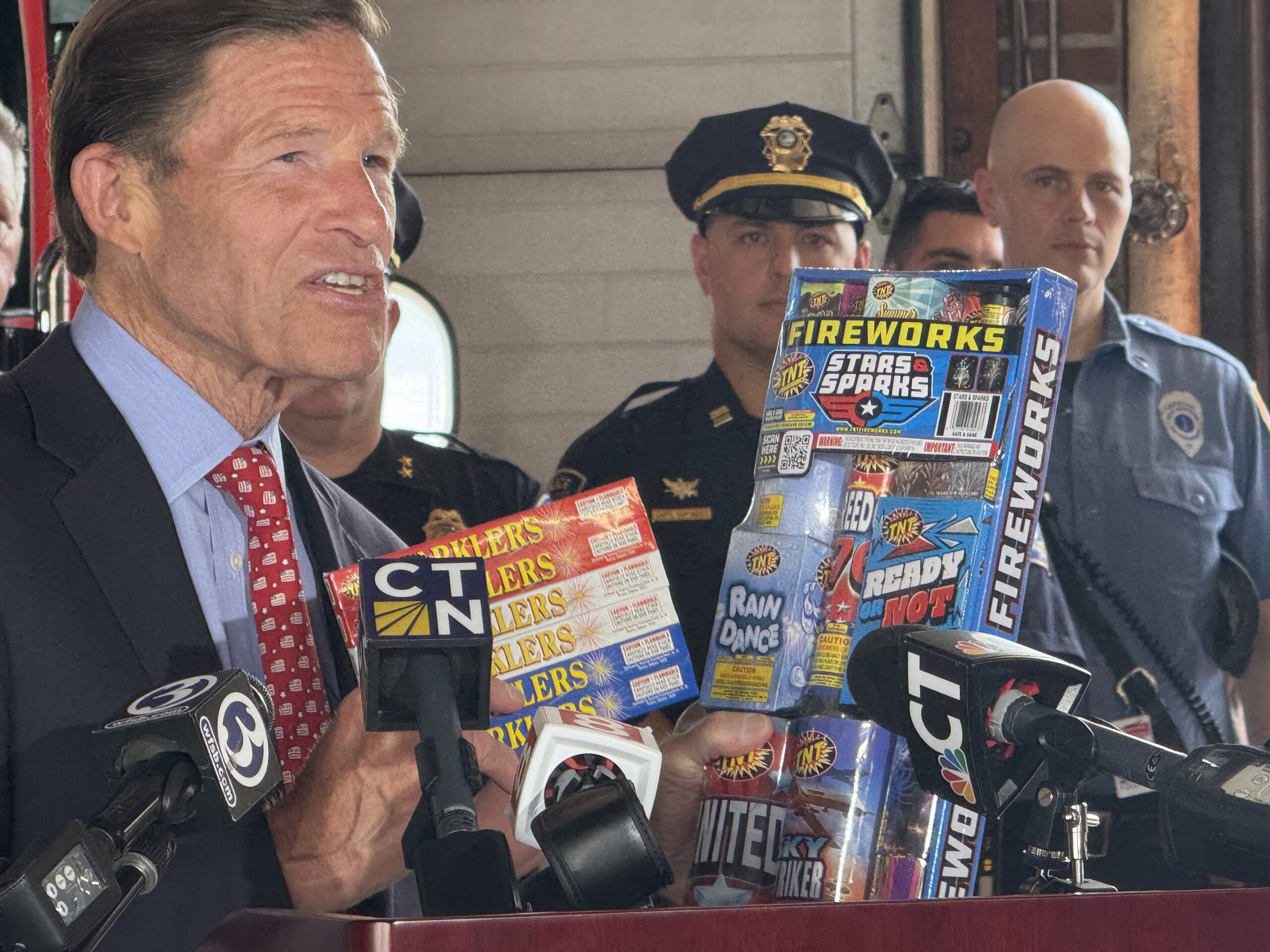Conard Students Provide Input to U.S. Sen. Blumenthal in Advance of Kids Online Safety Act Hearing

Audio By Carbonatix
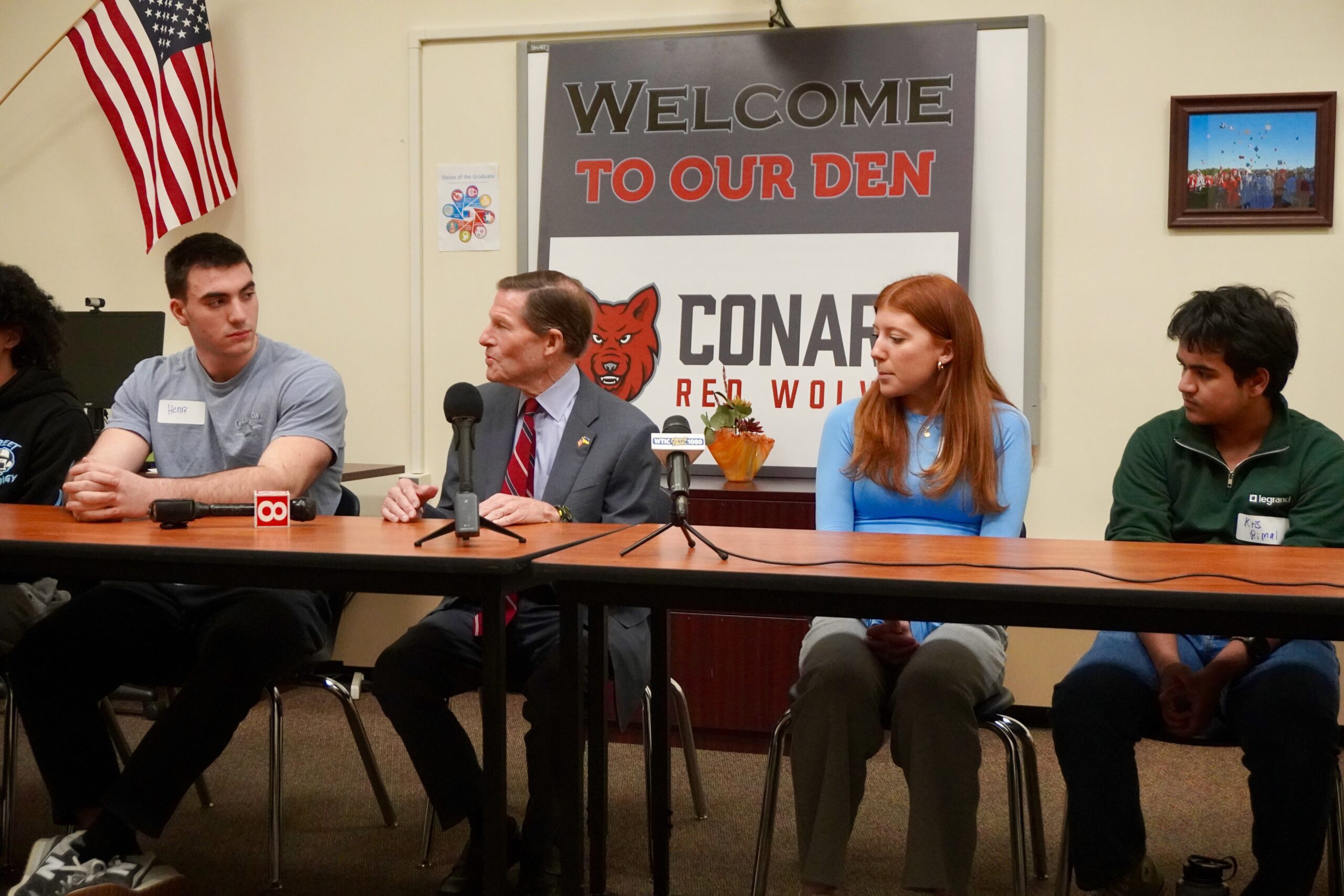
U.S. Sen. Richard Blumenthal met with students from Conard High School on Monday, Jan. 29, 2024, to talk about the impact of social media. From left are Henry Nace, Blumenthal, Julia Dean, and Kris Rimal. Photo credit: Ronni Newton
U.S. Sen. Richard Blumenthal was in West Hartford on Monday morning, discussing the Kids Online Safety Act with a group of Conard High School students.
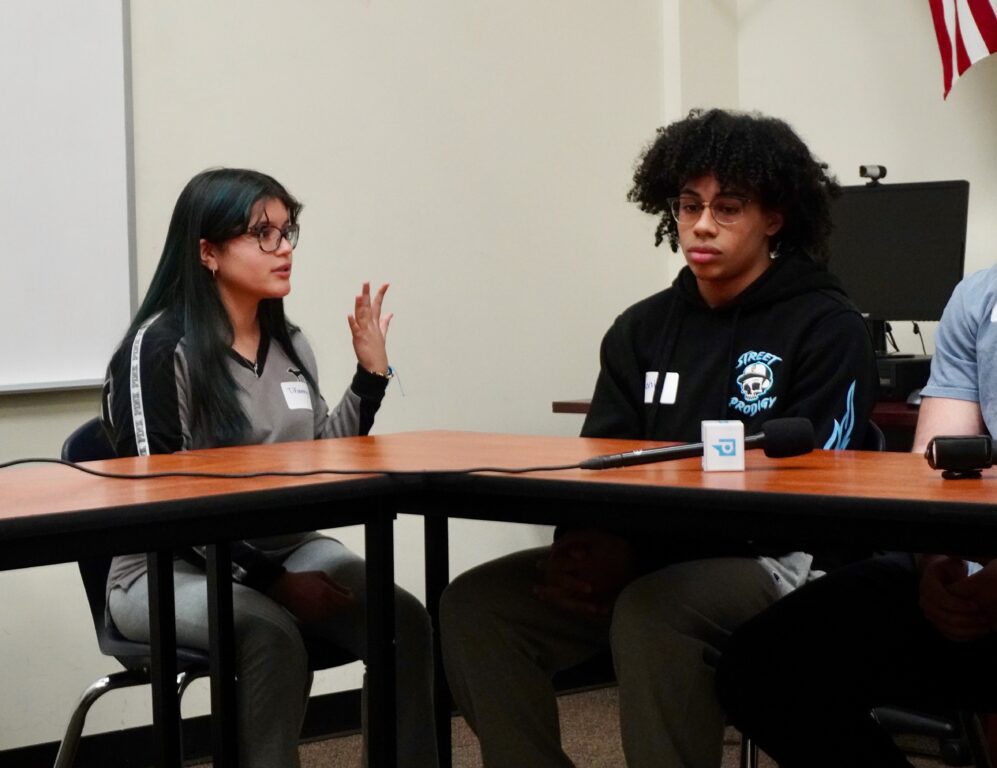
Conard students Tiffany Taborda Soto (left) and Ronin Harrison speak to U.S. Sen. Richard Blumenthal about the good and bad about social media on Jan. 29, 2024. Photo credit: Ronni Newton
By Ronni Newton
The Senate Judiciary Committee will hold a hearing this week with the CEOs of major tech companies in advance of floor action on the Kids Online Safety Act (KOSA), and on Monday morning U.S. Sen. Richard Blumenthal, the original sponsor of the bill, which he introduced with Sen. Marsha Blackburn (R-TN), held a conversation with students at West Hartford’s Conard High School to get their opinions about the good and bad aspects of social media.
“It is a critical moment for me,” Blumenthal told the students. KOSA unanimously passed out of the Senate Committee on Commerce, Transportation, and Infrastructure in July 2023, and since then the bill has gained bipartisan support of nearly half of the Senate. Whistleblowers have come forward with documentation about the use of algorithms that “put profit over safety,” he said.
The leaders of Meta, X, TikTok, Snap and Discord are scheduled to testify Wednesday about their failures to protect children online, and Blumenthal told the Conard students that the intent of the bill is to provide kids and their parents with additional tools, safeguards, and legal recourse, to hold companies more accountable for the content provided, and create more transparency regarding the use of algorithms – allowing for the ability to opt out of content that is prioritized based on user data.
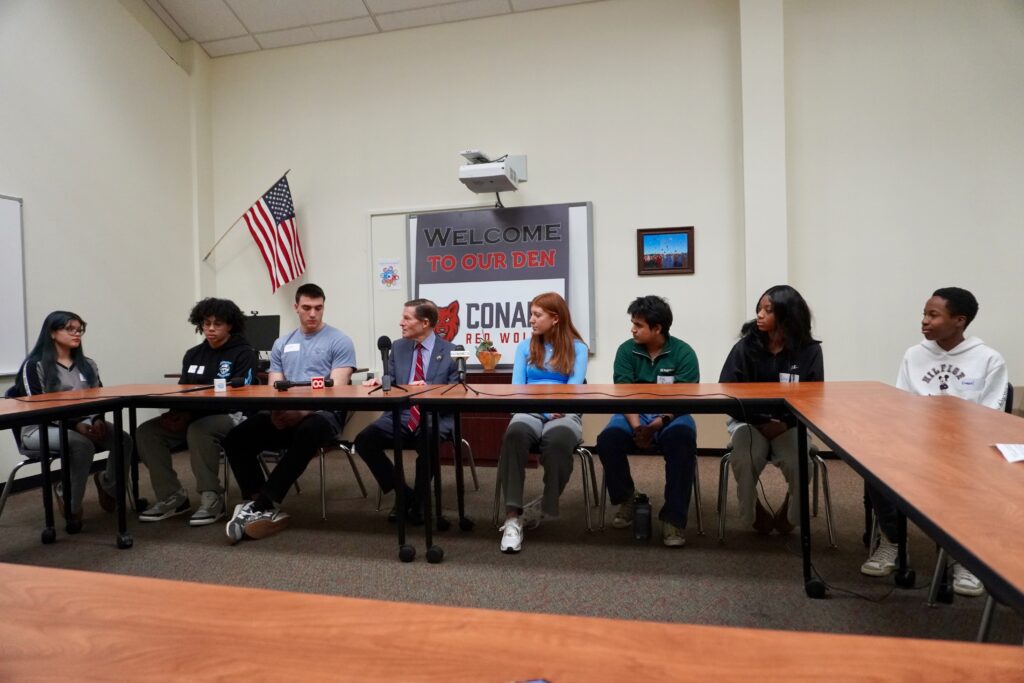
From left: Tiffany Taborda Soto, Ronin Harrison, Henry Nace, U.S. Sen. Richard Blumenthal, Julia Deane, Kris Rimal, Divine Nelson, and Emanuel Omokaro discuss social media at Conard High School on Jan. 29, 2024. Photo credit: Ronni Newton
All but one of the seven students said they were in fourth or fifth grade – around 10 or 11 years old – when they first started using social media.
“Being a girl on social media, it’s really a big deal to see what others are doing,” said Julia Deane, now a Conard senior. She’s very much aware, however, that “you only see what’s good about their life.”
“When I use social media I see a lot of everyone doing the same thing,” said Divine Nelson. She said it can make others feel like that’s what they should be doing.
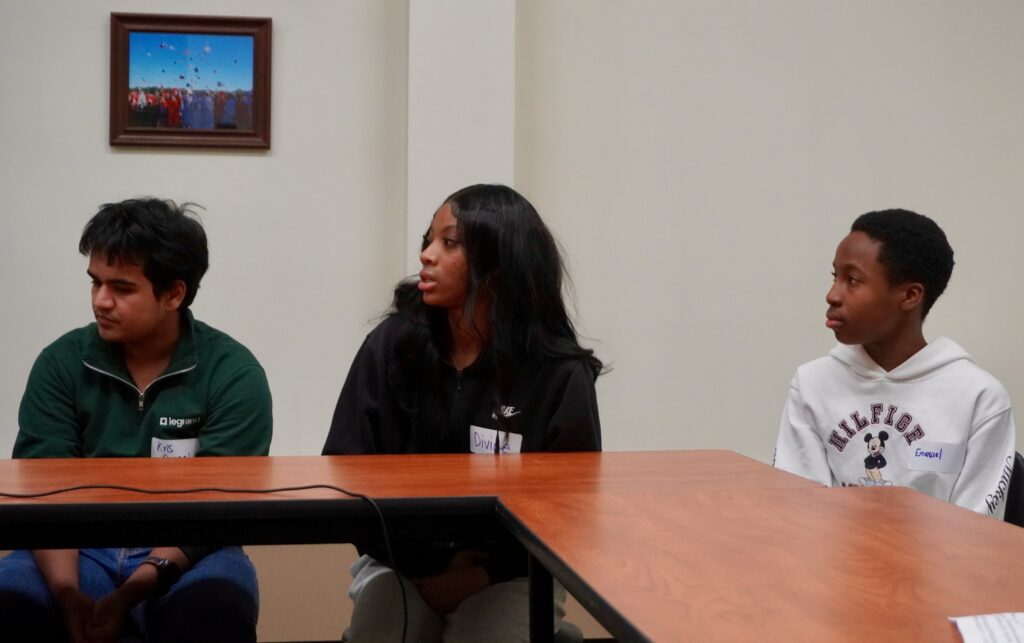
From left: Kris Rimal, Divine Nelson, and Emanuel Omokaro. Photo credit: Ronni Newton
“What I’ve seen the most is that people can’t get off social media. … It’s altered their bran chemistry,” said student Kris Rimal.
Blumenthal agreed. “As you know this stuff is designed to be addictive. The longer you stay on the more advertising the companies get,” he said. More eyeballs leads to more dollars, he added.
Some of the students said their parents used “Screen Time” as a control strategy when they were in middle school, and they continue to use it to control their time on social media, but almost every aspect of a students’ life requires use of a computer or table, including homework assignments.
Even just trying to listen to music, Kris said, involves being online and elements of social media.
Henry Nace said if a friend came to him and said they had a problem with social media, “I’d just tell them to delete that app.” He said that’s been his own strategy for dealing with a barrage of social media.
“What about age verification?” Blumenthal asked the students, and they all laughed.
“The fact that you laughed really says it all,” he said, and age verification is not part of the KOSA bill because of the loss of privacy that would entail.
Too much social media also gets in the way of schoolwork, the students agreed.
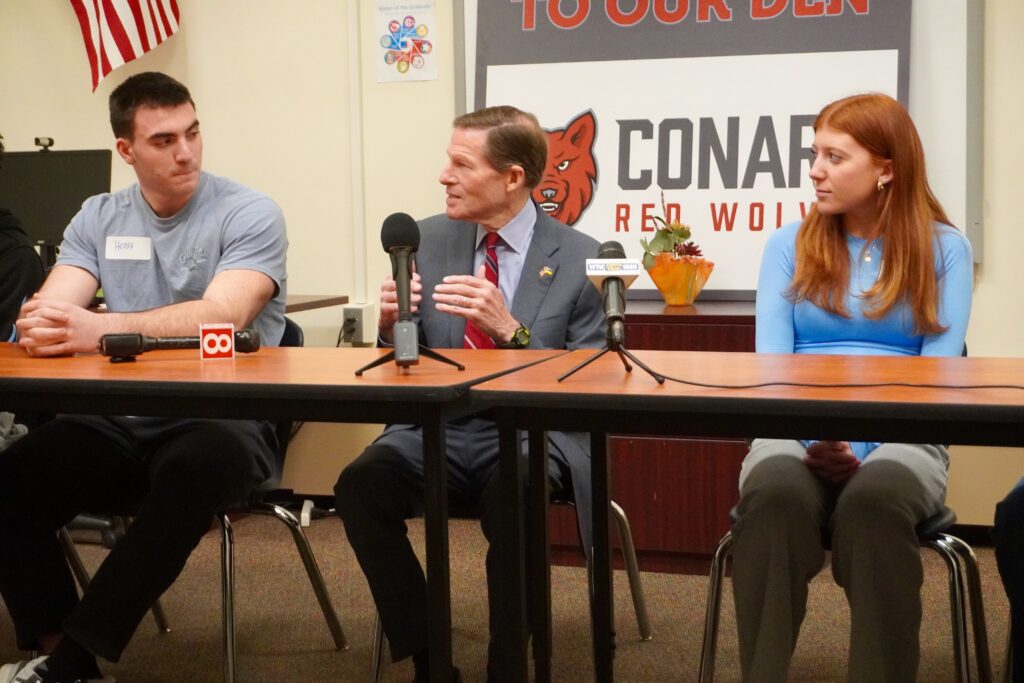
U.S. Sen. Richard Blumenthal met with students from Conard High School on Monday, Jan. 29, 2024, to talk about the impact of social media. From left are Henry Nace, Blumenthal, Julia Dean. Photo credit: Ronni Newton
Julia said some of her friends struggled to focus on studying during midterms earlier this month, because they instead spent time watching TikTok videos. Kris said in his English class they now have a phone caddy which holds everyone’s phones so they don’t use them in class.
Their are things that the students said they really appreciate about social media and online platforms.
“I never watch the news,” said Henry. He said he gets all of his his news from social media.
“With social media it’s easier to keep in touch,” said Ronin Harrison. He said it’s a way to connect and build new relationships.
Julia said she expects social media to help her make initial connections when she heads to college next year.
Tiffany Taborda Soto said social media can give people information about positive ways to express themselves. “You can also go to social media for ways to find out more about something you’re interested in,” Divine said, such as places to go if you are interested in thrifting.
One of the positives of social media is that you’re not limited by geography, Kris said. “You get such wide range of ideas and opinions.”
“When you see stuff there, do you believe all of it?” Blumenthal asked the students. Julia said social media is good for an overview, but she uses Google to get more information about topics that interest her,
“In the past you used to just have ‘The Onion,'” said Kris, but now there are so many ways to make things seem real enough to be believable.
None of the students said they had been victims of online predators, but some said friends have had random adults connect with them on social media sites.
“It’s way too easy for people you don’t know to come in contact with you,” said Ronin. He also said he’s reported being served content that he doesn’t want – such as gory video – but it hasn’t stopped and he thinks the algorithms need to become more responsive.
Blumenthal said there is “tremendous interest in enacting reforms” on the Senate side, and support in the House as well.
“I’m very hopeful that this spring we can pass legislation like the Kids Online Safety Act,” he said, but along with getting the support of the big tech companies that want to continue to make more money, the calendar is an obstacle. Snap has endorsed it, he said, and they will be working on the others.
If passed, enforcement will likely rest with the Attorney General’s Office and the Federal Trade Commission, Blumenthal said.
Monday’s conversation was recorded, and will be made available to his colleagues in advance of Wednesday’s hearing, Blumenthal said.
He said he hopes the students will take the initiative to reach out, to have their voices heard. “Never underestimate your power to have an impact,” he said.
Like what you see here? Click here to subscribe to We-Ha’s newsletter so you’ll always be in the know about what’s happening in West Hartford! Click the blue button below to become a supporter of We-Ha.com and our efforts to continue producing quality journalism.


